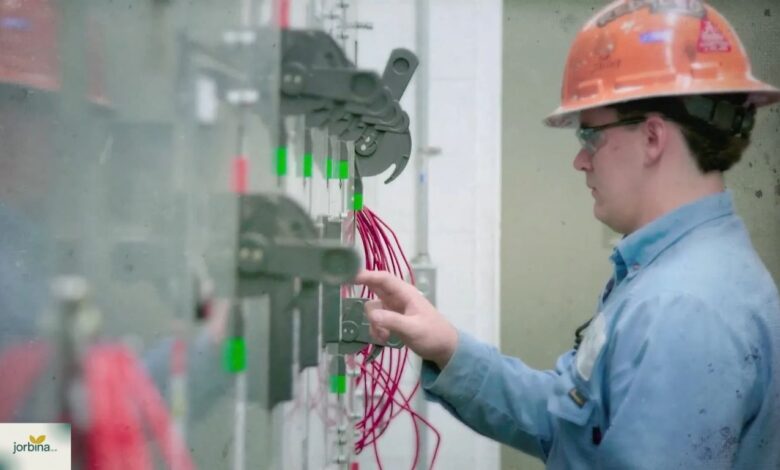Industrial Electrician UK: A Beginner’s Guide from One Spark to Another

Alright, lad, pull up a chair. Let’s have a proper chat about this trade you’re stepping into. You’ve chosen industrial electrics? Good choice. It’s not the easiest road, but if you stick with it, you’ll find it rewarding, mentally and financially.
When I started, I didn’t know the difference between a contractor and a subcontractor. Now, I’ve got more tools than I know what to do with and a head full of wiring regs, fault-finding routines, and the odd trick that’s not in the textbooks. So listen up, and I’ll walk you through what it means to be an industrial electrician in the UK.
So, What Exactly Is an Industrial Electrician?
You’re not changing lightbulbs in someone’s hallway, mate. Industrial electricians work in factories, manufacturing plants, refineries, warehouses—anywhere with serious machinery. We deal with big systems: three-phase motors, high-voltage gear, PLCs, conveyor belts, and all the controls that keep production ticking.
The job is about reliability and safety. If something breaks down, the whole line stops, and that costs companies big money. That’s why we’re paid decently, and why the pressure’s on to do it right.
It’s a world apart from domestic work. Less tea and biscuits, more technical diagrams and emergency callouts. But that’s what makes it exciting.
Why Pick Industrial Over Domestic?
For one, the pay’s better. I’m not knocking sparkies doing domestic rewires or fuse board upgrades, but if you want complex systems, challenge, and a career that can grow into controls, automation, or management, industrial is the way.
Plus, the demand is massive right now. There’s a shortage of electricians across the board, especially those who can handle more than just twin-and-earth. With everything going green—EV chargers, smart grids, factories moving to clean tech—we’re not short of work, trust me.
What’s the Money Like?
When you’re just starting, especially as an apprentice, you’ll probably see somewhere around £25k to £30k a year. Not glamorous, but you’re learning.
Once you’re qualified and confident, £35k to £40k is pretty normal. And if you stick with it—get into shift work, take on callouts, or move into specialist roles like PLC programming or HV systems—you can push £45k to £50k, sometimes more.
I’ve seen lads I trained earning more than me now because they stuck with it and specialised. Fair play to them.
How Do You Get Started?
It’s not complicated, but it does take time.
First things first: get your basics. That usually means GCSEs in Maths, English, and Science. Then, most people go the apprenticeship route. That’s hands-on work with a company while studying at college for your NVQ Level 3 in Electrotechnical Services.
You’ll be doing everything from conduit bending and panel wiring to testing and fault-finding. It’s a steep learning curve, but you’ll be better off for it.
If you want a clearer roadmap, check out this guide to becoming an electrician in the UK—a good resource that covers the basics and more.
Once your training’s done, get yourself registered, usually with the JIB, and start building your experience. If you’re already a bit older or changing careers, there are fast-track and adult learning options—but you still need on-the-job experience to be fully qualified.
What’s the Work Like Day to Day?
No two days are the same. One day you’re installing a new control panel; the next, you’re elbow-deep in a breakdown at 3 a.m. on a Saturday. There’s a lot of fault-finding—pressure sensors gone, a relay sticking, or something misfiring in a PLC program.
You’ll need to know how to read schematics, use test meters, and think methodically. Sometimes it’s you versus the machine, and the machine isn’t giving up its secrets easily.
And don’t expect everything to go by the book. Real-world electrics are messy. Panels wired by someone who retired in 1998, cable trays full of spaghetti, half the stuff undocumented—you’ve got to be a detective as much as a technician.
Is There Room to Grow?
Absolutely. Start with the basics, learn how things tick, then branch out.
You can move into:
- Controls and automation (big money here)
- Instrumentation and calibration
- High-voltage systems
- Site maintenance management
- Project installations
Some guys end up going offshore, into renewables, or running their own companies. The key is to keep learning. Stay up to date with the regs, take extra courses—18th Edition, AM2, CompEx if you’re around hazardous sites. The more you know, the more doors open.
Is It Safe?
It is—as long as you make it that way. You’ll be working around powerful machines and high voltages. Mistakes can cost fingers or worse. So take your time, isolate properly, and follow the procedure.
A good electrician is careful, not cocky. Never be afraid to ask, double-check, or slow things down if it doesn’t feel right. The lads will respect you more for speaking up than for pretending you know it all.
Is £40k a Good Salary in the UK?
What do we do? Yes, it’s decent. It gives you a comfortable life—pays the bills, keeps the van full, and lets you enjoy your weekends. And unlike office jobs, we’re not stuck staring at screens all day. There’s pride in fixing something real.
If you go into shift work, grab a few certs, and take on responsibility, you can pull in more than that. It’s not millionaire money, but it’s honest, skilled work, and people respect it.
From Me to You: A Bit of Advice
Look, I’ve trained a fair few sparks in my time, and the ones who go far are the ones who show up on time, keep their tools sharp, and listen. You won’t get everything right at first. That’s okay.
Don’t rush. Don’t blag it. Learn the craft properly. Be the one others can trust to get it done without cutting corners.
And finally, ask questions. If something doesn’t make sense, say so. We’ve all been there. Every senior spark was once standing where you are now, confused by a diagram or scared of touching the wrong wire.
Stick with it, and before long, you’ll be showing the next apprentice how it’s done.
Quick FAQs for You
How much do industrial electricians get paid in the UK?
Usually between £30k and £50k, depending on experience and overtime.
How to become an industrial electrician in the UK?
Do an apprenticeship, get your NVQ Level 3, pass your AM2, and build experience.
Are electricians in demand in the UK?
Yes—massively. Skilled sparks are in short supply, especially in industrial roles.
What type of electrician gets paid the most in the UK?
Specialists in automation, high-voltage, and renewables tend to earn the highest.
Is £40k a good salary in the UK?
Yes, especially in this trade—it’s above average and offers solid job security.
Don’t forget visit our website.



